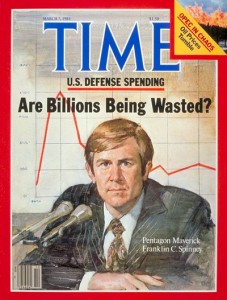 (Invitation only)
(Invitation only)
AGENDA
Supposedly it will be livestreamed from the conference website.
 (Invitation only)
(Invitation only)
AGENDA
Supposedly it will be livestreamed from the conference website.

Will Occupy Wall Street's Spark Reshape Our Politics?
Editor’s Note: Each week we cross-post an excerpt from Katrina vanden Heuvel’s column at the WashingtonPost.com. Read the full text of Katrina’s column here.
When the organizers of Occupy Wall Street first gathered to discuss their plan of action, the strategy that resonated most came from those who had occupied squares in Madrid and Athens, Tunis and Cairo. According to David Graeber, one of Occupy Wall Street’s organizers, “they explained that the model that seemed to work was to take something that seemed to be public space, reclaim it, and build up an organization and headquarters around [it].”
Six weeks later, on September 17, the occupation in downtown New York began, with scant attention, minimal and often derisive media coverage, and little expectation that it would light a spark where others had not. Now, in its fourth week, Occupy Wall Street has the quality of an exploding star: It is gathering energy in enormous and potent quantities, and propelling it outward to all corners of the country.
The protesters in the nascent movement have been criticized for being too decentralized and lacking a clear list of demands. But they are bearing witness to the corruption of our politics; if they made demands to those in power, it would suggest those in power could do something about it. This contradicts what is, perhaps, their most compelling point: that our institutions and politicians serve the top 1 percent, not the other 99.
The movement doesn’t need a policy or legislative agenda to send its message. The thrust of what it seeks–fueled both by anger and deep principles–has moral clarity. It wants corporate money out of politics. It wants the widening gap of income inequality to be narrowed substantially. And it wants meaningful solutions to the jobless crisis. In short, it wants a system that works for the 99 percent. Already Occupy Wall Street has sparked a conversation about reforms far more substantial than the stunted debate in Washington. Its energy will supercharge the arduous work other organizations have been doing for years, amplifying their actions as well as their agendas.
Occupy Wall Street is now in more than 800 cities and counting. Each encampment has its own character, from thousands marching in San Francisco to a handful gathering in Boise. These are authentic grassroots operations, so each one will reflect the local culture of protest while reproducing what seems right from the original.
Republicans have reacted bitterly.
Editor’s Note: Read the full text of Katrina’s column here.
See Also:
Mini-Me: Katrina vanden Heuvel on Electoral Reform

Katrina Vanden Heuvel, writer for the Nation was interviewed on Democracy Now and mentioned electoral reform (after Danny Schecter segment) in hopes that it would sprout from/around Occupy Wall Street.
Independent Media Stalwarts Katrina vanden Heuvel & Danny Schechter Speak Out at Occupy Wall Street
Democracy Now!, 11 October 2011
“The moral clarity of this movement is what I think has moved people to get up and walk and be in motion,” says Katrina vanden Heuvel, editor and publisher of The Nation magazine. “And what’s so interesting to me is—I was here last Wednesday for the march to Foley Square—that so many groups, which have been trying to get some energy, are finding the spark in here and coming together.” [includes rush transcript]
QUOTE: “The moral clarity of this movement is what I think has moved people to get up and walk and be in motion,” says Katrina vanden Heuvel, editor and publisher of The Nation magazine. “And what’s so interesting to me is—I was here last Wednesday for the march to Foley Square—that so many groups, which have been trying to get some energy, are finding the spark in here and coming together.” [includes rush transcript]
Phi Beta Iota: Katrina's interview begins at 41:20. A pox on the two-party tyranny–one bird, two wings, same shit. OccupyWallStreet is not just independent, but independent of those who pretend to organize “independents.”
See Also:

After September 11: Our State of Exception
Mark Danner
New York Review of Books, October 13, 2011
EXTRACT
Call it, then, the state of exception: these years during which, in the name of security, some of our accustomed rights and freedoms are circumscribed or set aside, the years during which we live in a different time. This different time of ours has now extended ten years—the longest by far in American history—with little sense of an ending. Indeed, the very endlessness of this state of exception—a quality emphasized even as it was imposed—and the broad acceptance of that endlessness, the state of exception’s increasing normalization, are among its distinguishing marks.
. . . . .
Before the War on Terror, official torture was illegal and anathema; today it is a policy choice.
. . . . . .
Ten years later, what was the exceptional has become the normal. The improvisations of panic are the reality of our daily lives.
Read full article.
Phi Beta Iota: This is a very thoughtful article that cuts to the heart of the matter, i.e. the U.S. Government's divorce from both reality and principle–the immorality and insanity of all that the U.S. Government does “in our name” and at our expense.

For Immediate Release
October 3, 2011
Contact: Glenn Turner, 917-817-3396
glenn@ripplestrategies.com
Corn vs. Sugar Industries Legal Battle Heats Up Over “High Fructose Corn Syrup” Name Change
New Website FoodIdentityTheft.com Provides Background for Reporters and Consumers
Expert Legal Spokesperson Available For Interviews
WASHINGTON, October 3, 2011 High-Fructose Corn Syrup (HFCS) is a man-made sweetener used in thousands of grocery store products and it has a serious image problem. Consumers are avoiding it. Food companies are taking it out of the products they make. Some supermarkets have banned it. Demand for this highly-processed ingredient is falling fast.
The Corn Refiners Association comprised of corporations that make HFCS -decided that changing the name was a way to fix this problem. They are petitioning the FDA so that HFCS can legally be called “corn sugar” and ultimately just “sugar². An official decision hasn¹t yet been made, but in 2008 the Corn Refiners Association began a $50 million dollar marketing campaign labeling HFCS as ³corn sugar². They are now being sued by a group of sugar farmers and refiners who believe the name change will confuse consumers and harm the sugar industry.
Continue reading “John Steiner: US Government to Rename Corn as Sugar?”

The Real Story of How Israel Was Created
CounterPunch, October 11, 2011
To better understand the Palestinian bid for membership in the United Nations, it is important to understand the original 1947 U.N. action on Israel-Palestine.
The common representation of Israel’s birth is that the U.N. created Israel, that the world was in favor of this move, and that the U.S. governmental establishment supported it. All these assumptions are demonstrably incorrect.
In reality, while the U.N. General Assembly recommended the creation of a Jewish state in part of Palestine, that recommendation was non-binding and never implemented by the Security Council.
Second, the General Assembly passed that recommendation only after Israel proponents threatened and bribed numerous countries in order to gain a required two-thirds of votes.
Third, the U.S. administration supported the recommendation out of domestic electoral considerations and took this position over the strenuous objections of the State Department, the CIA, and the Pentagon.
The passage of the General Assembly recommendation sparked increased violence in the region. Over the following months the armed wing of the pro-Israel movement, which had long been preparing for war, perpetrated a series of massacres and expulsions throughout Palestine, implementing a plan to clear the way for a majority-Jewish state.
It was this armed aggression, and the ethnic cleansing of at least three-quarters of a million indigenous Palestinians, that created the Jewish state on land that had been 95 percent non-Jewish prior to Zionist immigration and that even after years of immigration remained 70 percent non-Jewish. And despite the shallow patina of legality its partisans extracted from the General Assembly, Israel was born over the opposition of American experts and of governments around the world, who opposed it on both pragmatic and moral grounds.
Let us look at the specifics.
Read full article with specifics.
Phi Beta Iota: The specifics demonstrate with great clarity that at the time the U.S. Government had intelligence but lacked integrity. Today the U.S. Government lacks both intelligence and integrity. Electoral Reform is the sole possible demand that can resolve the crisis of US democracy and US capitalism run amok–inverted into velvet theatrical facism.

How Real is Versailles on the Potomac?
Chuck Spinney, 11 October 2011
Barcelona, Catalunya
I began using the phrase Versailles on the Potomac in the late 1990s as a metaphor for the ‘let-them-eat-cake’ politics of the Military – Industrial – Congressional Complex or MICC. The MICC’s pervasive practices of front loading and political engineering evolved insensibly during the Cold War to create a dysfunctional majority faction in the Congress that undermined the checks and balances of the Constitution by gradually transferring Congress’s power of the purse to the President. By 1990, it was clear the insatiable greed of MICC would prevent a sensible adaptation to the end of the Cold War.1 In my view, which I think has been borne out by events, the MICC’s greed not only undermined our nation’s adaptation to the collapse of the Soviet Union, but drove the United States into a reckless policy of adventurism and war warmongering, a policy that benefitted a few at the expense of the many. I summed up this viewpoint last January in my essay, The Domestic Roots of Perpetual War, which is also the first chapter in the Defense Labyrinth, a short handbook written by insiders to help interested citizens understand how the Pentagon really operates.2
Fast forward to the fall of 2011: The economic crash that began in 2007, the government's response to it, and the moral collapse of a one of the most promising presidents in American history make it clear that the metaphor Versailles on the Potomac should not have been limited to the MICC, because the MICC is but one thread in a larger fabric of degenerate political mutation. Since the late 1970s, democratic governance in the United States has been mutating into what can now be characterized as an intolerant neo-fascist oligarchy, where an increasingly unequal distribution of wealth is destroying the American middle class by enriching a tiny minority with unprecedented wealth. It is also clear that this super-rich minority is using its wealth to entrench and perpetuate its power by destroying our traditional institutions.
Think my statement is a little too wild?
Read the essay Debt and Dumb, published by the current issue of Vanity Fair. The authors, Simon Johnson and James Kwak, are hardly radicals,3 but they end their essay on in the same place: on the larger question of the ongoing political mutation of the United States into a Versailles on the Potomac.
Are the current demonstrations triggered by the Occupy Wall Street movement, and more importantly, the Oligarchy's hysterical reaction to them, in any way indicative of pre-revolutionary instabilities similar to those that emerged spontaneously in France during the late 18th Century?
Only time will tell, but massive forces may be afoot, and if they are afoot, they may well spin out of control.
1 James Madison explained the dangers of a majority faction in Federalist #10, where he laid out the logic of the system of checks and balances in the design of the Constitution. My pamphlet, Defense Power Games (1990), explained how the gaming strategies evolved by the MICC during the Cold War undermined these checks and balances and explained why the end of the Cold War would not result in a real peace dividend.
3 They are editors of the influential financial blog, The Baseline Scenario. Johnson is a professor at MIT and a former Chief Economist of the International Monetary Fund.<
Phi Beta Iota: A tough read, getting through it twice confirms that the US Government and its ability to borrow are of concern to the 1% only in relation to their selfish interests. There is a chasm between those that pay taxes and those that steal their tax funds so great as to warrant a revolution.See Also:
Review: Griftopia–Bubble Machines, Vampire Squids, and the Long Con That Is Breaking America
Review: Empire of Illusion: The End of Literacy and the Triumph of Spectacle